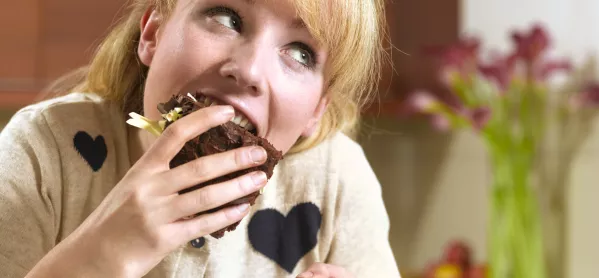I have to warn you, I am known to my family and friends as the Sugar Police.
So if you really, really like cake, you may not like what I have to say.
It’s true that I am militant about my sugar intake, but only because I have experienced issues with my health as a result of an earlier sugar addiction.
Quick read: Wellbeing: are you feeding your anxiety monster?
Quick listen: The truth about mental health in schools
Want to know more? Green Bronx Machine - a garden programme with a real growth mindset…
I spent a lot of the 1980s and 1990s with my grandparents, who were still revelling in the fact that rationing had ended. This meant a diet of jam tarts, fondant fancies and golden syrup sandwiches (my granddad was a culinary genius).
But it also meant that in my late teens I experienced fainting spells, acne and an irregular menstrual cycle. And the cause?
It wasn’t just “being a teenager” as many doctors diagnosed (the symptoms plagued me throughout my twenties). You guessed it. It was sugar.
The long-term effects of sugar
We know that too much of the white stuff can cause tooth decay, and Cancer Research UK has highlighted obesity as the cause of many cancers.
The problem relates to how much “free sugar” we are consuming. These are the sugars that are added to our food and drinks, such as biscuits, fizzy drinks and, yes, that breaktime cake.
Free sugars also occur naturally in honey, syrups (maple, agave and golden), unsweetened fruit and vegetable juices and smoothies. This can be rather confusing for people trying to make the right diet choices.
The government recommends that free sugars should not make up more than 5 per cent of our daily calorie intake. This means that adults should consume no more than 30g (roughly seven sugar cubes) each day.
Thankfully, the sugars found in vegetables, fruit and milk do not count as free sugars.
The health complications of too much free sugar are well documented: cancer, heart disease, type two diabetes can all result from an over-indulgence in free sugars. But perhaps less well-known is the impact sugar can have on your hormones.
Too much of it will affect your body’s insulin production, which can lead to hormone imbalances, triggering conditions such as polycystic ovary syndrome in women.
The risks of free sugars
Sorry if this is a bit doom and gloom. It’s not like you should never indulge your sweet tooth. We all know that a little of what we fancy does us good.
Bringing in cakes or other treats into the workplace is an important part of bonding. Nothing quite beats sitting down with a cuppa and a slice of cake and letting off a bit of steam.
Staffroom cake plays an important role in lowering stress levels and boosting wellbeing. It also serves the vital function of making after-school meetings more bearable.
Gemma Corby is a former special educational needs and disability coordinator (Sendco) and freelance writer





